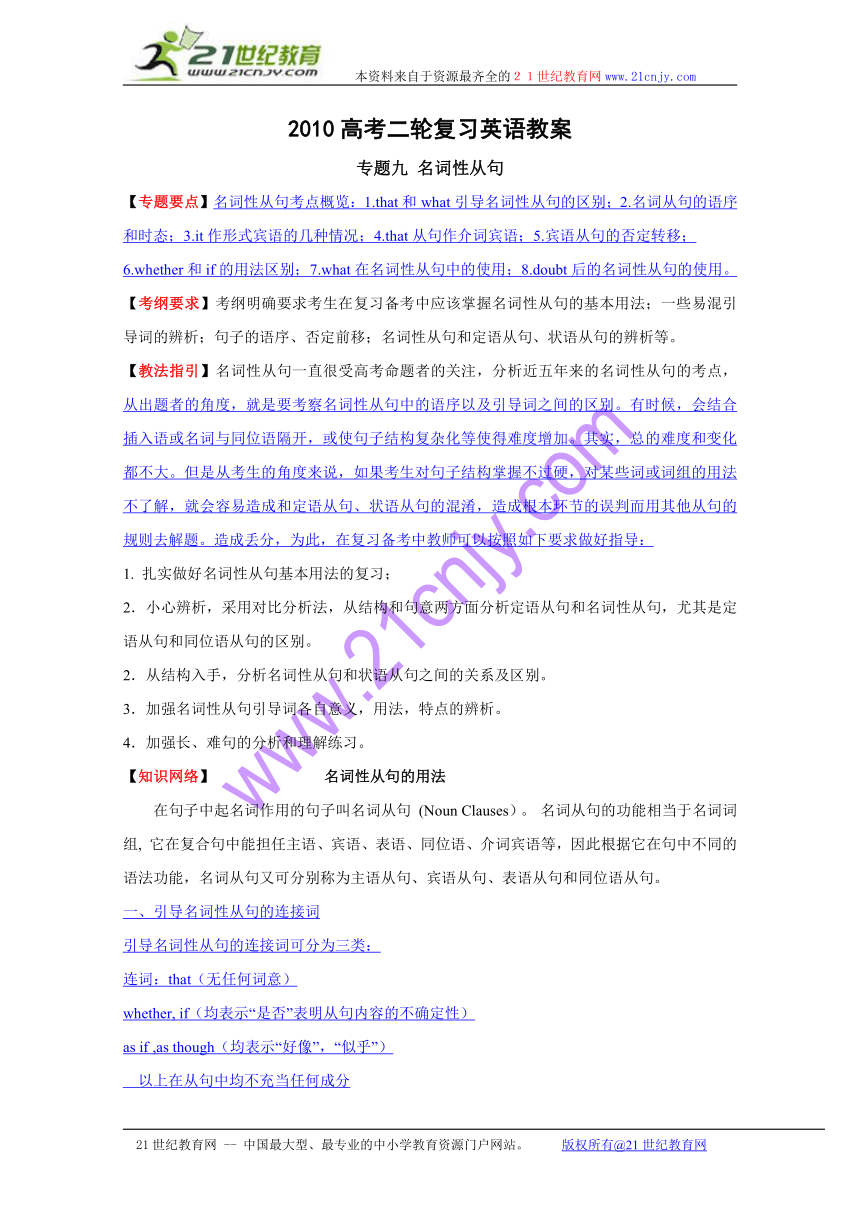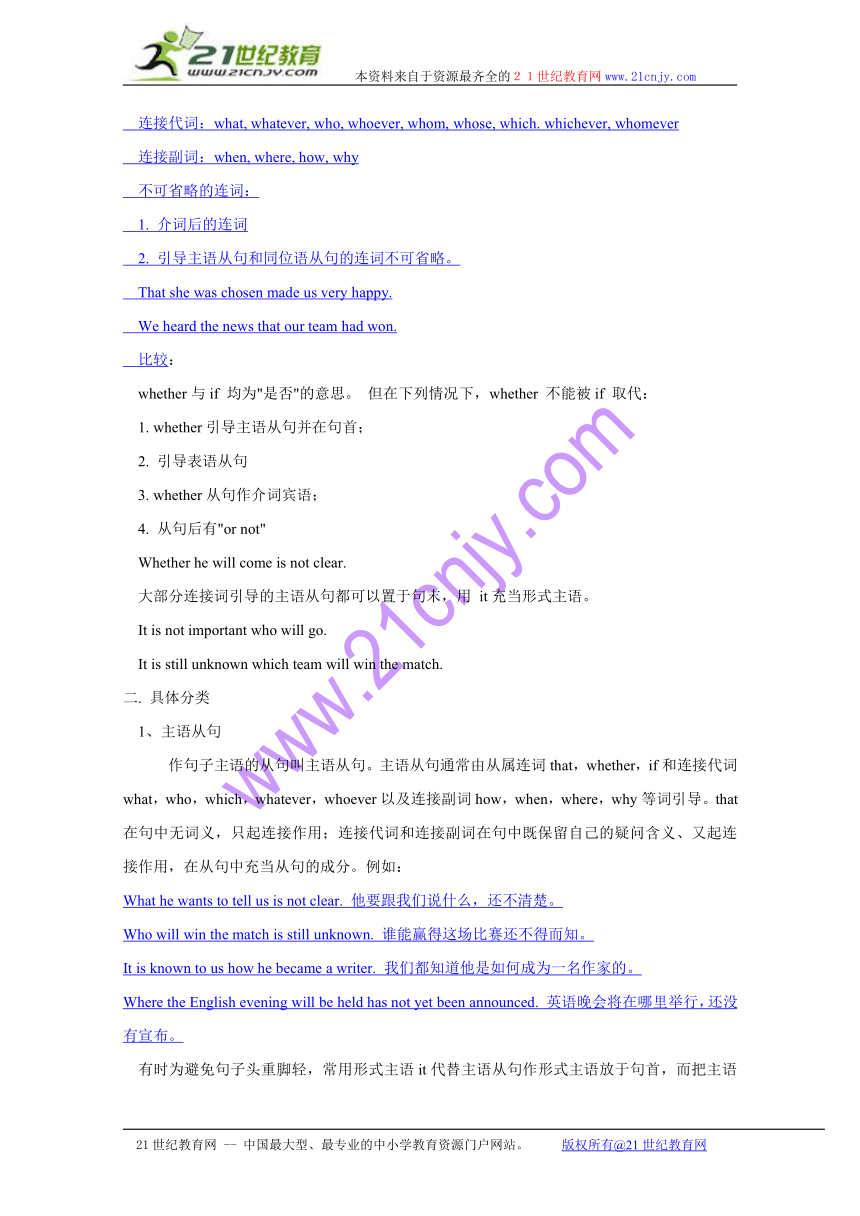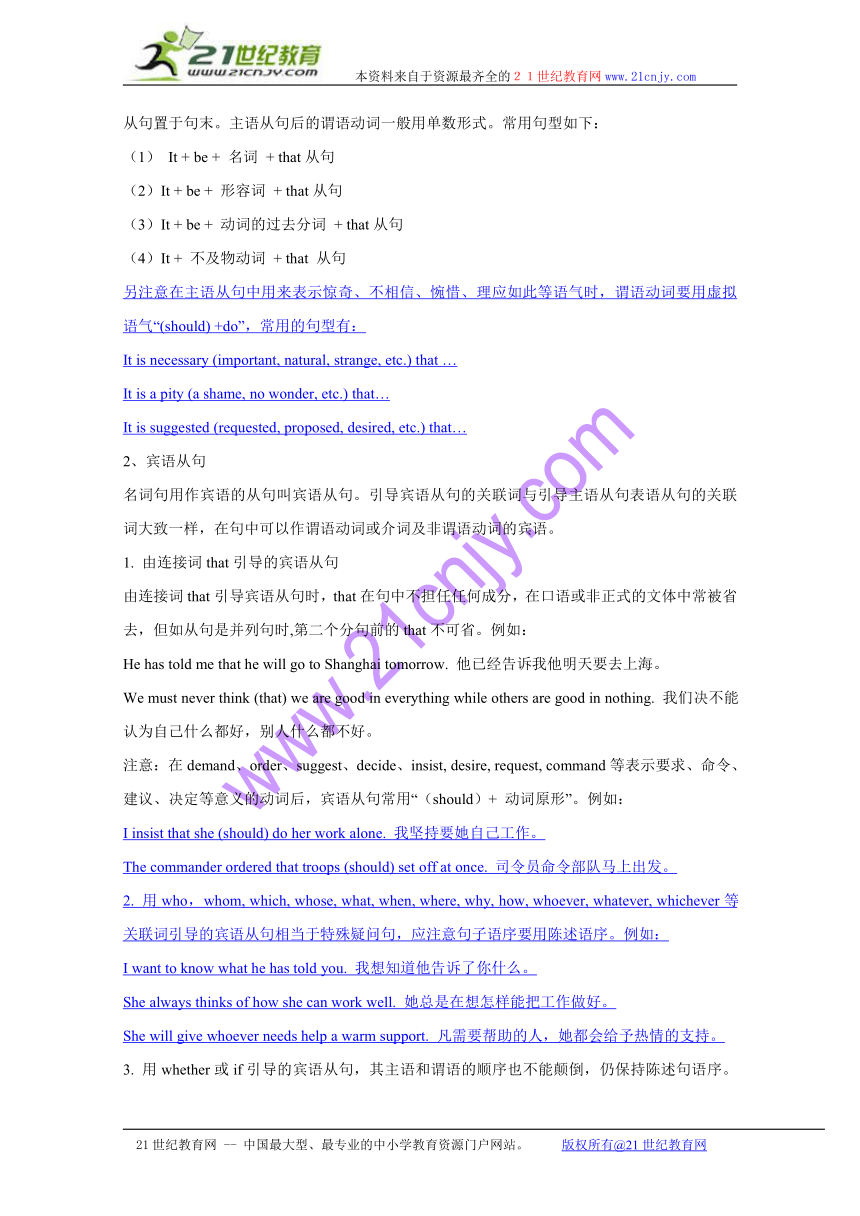2010高考二轮复习英语教案-专题九 名词性从句
文档属性
| 名称 | 2010高考二轮复习英语教案-专题九 名词性从句 |

|
|
| 格式 | rar | ||
| 文件大小 | 18.0KB | ||
| 资源类型 | 教案 | ||
| 版本资源 | 通用版 | ||
| 科目 | 英语 | ||
| 更新时间 | 2009-11-06 19:39:00 | ||
图片预览



文档简介
本资料来自于资源最齐全的21世纪教育网www.21cnjy.com
2010高考二轮复习英语教案
专题九 名词性从句
【专题要点】名词性从句考点概览:1.that和what引导名词性从句的区别;2.名词从句的语序和时态;3.it作形式宾语的几种情况;4.that从句作介词宾语;5.宾语从句的否定转移;6.whether和if的用法区别;7.what在名词性从句中的使用;8.doubt后的名词性从句的使用。 ( http: / / www.21cnjy.com / )
6.whether和if的用法区别;7.what在名词性从句中的使用;8.doubt后的名词性从句的使用。
【考纲要求】考纲明确要求考生在复习备考中应该掌握名词性从句的基本用法;一些易混引导词的辨析;句子的语序、否定前移;名词性从句和定语从句、状语从句的辨析等。
【教法指引】名词性从句一直很受高考命题者的关注,分高考资源网析近五年来的名词性从句的考点,从出题者的角度,就是要考察名词性从句中的语序以及引导词之间的区别。有时候,会结合插入语或名词与同位语隔开,或使句子结构复杂化等使得难度增加。其实,总的难度和变化都不大。但是从考生的角度来说,如果考生对句子结构掌握不过硬,对某些词或词组的用法不了解,就会容易造成和定语从句、状语从句的混淆,造成根本环节的误判而用其他从句的规则去解题。造成丢分,为此,在复习备考中教师可以按照如下要求做好指导: ( http: / / www.21cnjy.com / )
1. 扎实做好名词性从句基本用法的复习;
2.小心辨析,采用对比分析法,从结构和句意两方面分析定语从句和名词性从句,尤其是定语从句和同位语从句的区别。
2.从结构入手,分析名词性从句和状语从句之间的关系及区别。
3.加强名词性从句引导词各自意义,用法,特点的辨析。
4.加强长、难句的分析和理解练习。
【知识网络】 名词性从句的用法
在句子中起名词作用的句子叫名词从句 (Noun Clauses)。 名词从句的功能相当于名词词组, 它在复合句中能担任主语、宾语、表语、同位语、介词宾语等,因此根据它在句中不同的语法功能,名词从句又可分别称为主语从句、宾语从句、表语从句和同位语从句。
一、引导名词性从句的连接词引导名词性从句的连接词可分为三类:连词:that(无任何词意)whether, if(均表示“是否”表明从句内容的不确定性)as if ,as though(均表示“好像”,“似乎”) 以上在从句中均不充当任何成分 ( http: / / www.21cnjy.com / )
引导名词性从句的连接词可分为三类:
连词:that(无任何词意)
whether, if(均表示“是否”表明从句内容的不确定性)
as if ,as though(均表示“好像”,“似乎”)
以上在从句中均不充当任何成分
连接代词:what, whatever, who, whoever, whom, whose, which. whichever, whomever 连接副词:when, where, how, why 不可省略的连词: 1. 介词后的连词 2. 引导主语从句和同位语从句的连词不可省略。 That she was chosen made us very happy. We heard the news that our team had won. 比较 ( http: / / www.21cnjy.com / )
连接副词:when, where, how, why
不可省略的连词:
1. 介词后的连词
2. 引导主语从句和同位语从句的连词不可省略。
That she was chosen made us very happy.
We heard the news that our team had won.
比较:
whether与if 均为"是否"的意思。 但在下列情况下,whether 不能被if 取代:
1. whether引导主语从句并在句首;
2. 引导表语从句
3. whether从句作介词宾语;
4. 从句后有"or not"
Whether he will come is not clear.
大部分连接词引导的主语从句都可以置于句末,用 it充当形式主语。
It is not important who will go.
It is still unknown which team will win the match.
二. 具体分类
1、主语从句
作句子主语的从句叫主语从句。主语从句通常由从属连词that,whether,if和连接代词what,who,which,whatever,whoever以及连接副词how,when,where,why等词引导。that在句中无词义,只起连接作用;连接代词和连接副词在句中既保留自己的疑问含义、又起连接作用,在从句中充当从句的成分。例如:
What he wants to tell us is not clear. 他要跟我们说什么,还不清楚。Who will win the match is still unknown. 谁能赢得这场比赛还不得而知。It is known to us how he became a writer. 我们都知道他是如何成为一名作家的。Where the English evening will be held has not yet been announced. 英语晚会将在哪里举行,还没有宣布。 ( http: / / www.21cnjy.com / )
Who will win the match is still unknown. 谁能赢得这场比赛还不得而知。
It is known to us how he became a writer. 我们都知道他是如何成为一名作家的。
Where the English evening will be held has not yet been announced. 英语晚会将在哪里举行,还没有宣布。
有时为避免句子头重脚轻,常用形式主语it代替主语从句作形式主语放于句首,而把主语从句置于句末。主语从句后的谓语动词一般用单数形式。常用句型如下:
(1) It + be + 名词 + that从句
(2)It + be + 形容词 + that从句
(3)It + be + 动词的过去分词 + that从句
(4)It + 不及物动词 + that 从句
另注意在主语从句中用来表示惊奇、不相信、惋惜、理应如此等语气时,谓语动词要用虚拟语气“(should) +do”,常用的句型有:It is necessary (important, natural, strange, etc.) that …It is a pity (a shame, no wonder, etc.) that…It is suggested (requested, proposed, desired, etc.) that… ( http: / / www.21cnjy.com / )
It is necessary (important, natural, strange, etc.) that …
It is a pity (a shame, no wonder, etc.) that…
It is suggested (requested, proposed, desired, etc.) that…
2、宾语从句
名词句用作宾语的从句叫宾语从句。引导宾语从句的关联词与引导主语从句表语从句的关联词大致一样,在句中可以作谓语动词或介词及非谓语动词的宾语。
1. 由连接词that引导的宾语从句
由连接词that引导宾语从句时,that在句中不担任任何成分,在口语或非正式的文体中常被省去,但如从句是并列句时,第二个分句前的that不可省。例如:
He has told me that he will go to Shanghai tomorrow. 他已经告诉我他明天要去上海。
We must never think (that) we are good in everything while others are good in nothing. 我们决不能认为自己什么都好,别人什么都不好。
注意:在demand、order、suggest、decide、insist, desire, request, command等表示要求、命令、建议、决定等意义的动词后,宾语从句常用“(should)+ 动词原形”。例如:
I insist that she (should) do her work alone. 我坚持要她自己工作。The commander ordered that troops (should) set off at once. 司令员命令部队马上出发。2. 用who,whom, which, whose, what, when, where, why, how, whoever, whatever, whichever等关联词引导的宾语从句相当于特殊疑问句,应注意句子语序要用陈述语序。例如:I want to know what he has told you. 我想知道他告诉了你什么。She always thinks of how she can work well. 她总是在想怎样能把工作做好。She will give whoever needs help a warm support. 凡需要帮助的人,她都会给予热情的支持。 ( http: / / www.21cnjy.com / )
The commander ordered that troops (should) set off at once. 司令员命令部队马上出发。
2. 用who,whom, which, whose, what, when, where, why, how, whoever, whatever, whichever等关联词引导的宾语从句相当于特殊疑问句,应注意句子语序要用陈述语序。例如:
I want to know what he has told you. 我想知道他告诉了你什么。
She always thinks of how she can work well. 她总是在想怎样能把工作做好。
She will give whoever needs help a warm support. 凡需要帮助的人,她都会给予热情的支持。
3. 用whether或if引导的宾语从句,其主语和谓语的顺序也不能颠倒,仍保持陈述句语序。此外,whether与if 在作“是否”的意思讲时在下列情况下一般只能用whether,不用if:
a. 引导主语从句并在句首时;b. 引导表语从句时;c . 引导从句作介词宾语时;d. 从句后有“or not”时;e. 后接动词不定式时。例如:
Whether there is life on the moon is an interesting question. 月球上有没有生命是个有趣的问题。
The question is whether she should have a low opinion of the test
Everything depends on whether we have enough money. 一切要看我们是否有足够的钱。
I wonder whether he will come or not. 我想知道他来还是不来。
Can you tell me whether to go or to stay 你能否告诉我是去还是留?
4. 注意宾语从句中的时态呼应,当主句动词是现在时,从句根据自身的句子情况,而使用
不同时态。例如:
he studies English every day. (从句用一般现在时)
he studied English last term. (从句用一般过去时)
I know (that) he will study English next year. (从句用一般将来时)
he has studied English since 1998. (从句用现在完成时)
当主句动词是过去时态(could, would除外),从句则要用相应的过去时态,如一般过去时,过去进行时,过去将来时等;当从句表示的是客观真理,科学原理,自然现象,则从句仍用现在时态。例如:
The teacher told us that Tom had left us for America.
5. think, believe, imagine, suppose等等动词引起的否定性宾语从句中,要把上述主句中的动词变为否定式。即将从句中的否定形式移到主句中。例如:We don’t think you are here. 我们认为你不在这。I don’t believe he will do so. 我相信他不会这样做。3、表语从句在句中作表语的从句叫表语从句。引导表语从句的关联词与引导主语从句的关联词大致一样,表语从句位于连系动词后,有时用as if引导。其基本结构为:主语 + 系动词 + that从句。例 ( http: / / www.21cnjy.com / )
We don’t think you are here. 我们认为你不在这。
I don’t believe he will do so. 我相信他不会这样做。
3、表语从句
在句中作表语的从句叫表语从句。引导表语从句的关联词与引导主语从句的关联词大致一样,表语从句位于连系动词后,有时用as if引导。其基本结构为:主语 + 系动词 + that从句。例如:
The fact is that we have lost the game. 事实是我们已经输了这场比赛。
That’s just what I want. 这正是我想要的。
This is where our problem lies. 这就是我们的问题所在。
That is why he didn’t come to the meeting. 那就是他为什么不到会的原因。
It looks as if it is going to rain. 看上去天要下雨了。
需要注意的,当主语是reason时,表语从句要用that引导而不是because。例如:
The reason why he was late was that he missed the train by one minute this morning .
【点拨】whether 可引导表语从句,但与之同义的if却通常不用于引导表语从句。
4、 同位语从句
同位语从句说明其前面的名词的具体内容。同位语从句通常由that引导,可用于同位语从句的名词有advice、demand、doubt、fact、hope、idea、information、message、news、order、problem、promise、question、request、suggestion、truth、wish、word等。例如:
The news that we won the game is exciting. 我们赢得这场比赛的消息令人激动。
I have no idea when he will come back home. 我不知道他什么时候回来。
The thought came to him that Mary had probably fallen ill. 他想到可能玛丽生病了。
三、对比与用法
1、同位语从句和定语从句的区别:
that作为关系代词,可以引导定语从句,充当句子成分,在从句中作宾语时可以省略; that引导同位语从句时,起连词的作用,没有实际意义,不充当句子成分,一般不能省略。
试比较下面两个例句:
I had no idea that you were here.(that引导同位语从句,不能省略)
Have you got the idea(that)this book gives you of life in ancient Greece?(that引导定语从句,作宾语,可以省略)
2、That-从句作主语通常用it作先行词,而将that-从句置于句末。
用it作形式主语的that-从句有以下四种不同的搭配关系:
a. It + be +形容词+ that-从句It is necessary that… 有必要……It is important that… 重要的是……It is obvious that… 很明显……b. It + be + -ed 分词+ that-从句It is believed that… 人们相信……It is known to all that… 从所周知……It has been decided that… 已决定……c. It + be +名词+ that-从句It is common knowledge that… ……是常识 ( http: / / www.21cnjy.com / )
It is necessary that… 有必要……
It is important that… 重要的是……
It is obvious that… 很明显……
b. It + be + -ed 分词+ that-从句
It is believed that… 人们相信……
It is known to all that… 从所周知……
It has been decided that… 已决定……
c. It + be +名词+ that-从句
It is common knowledge that… ……是常识
It is a surprise that… 令人惊奇的是……
It is a fact that… 事实是……
d. It +不及物动词+ that-分句
It appears that… 似乎……
It happens that… 碰巧……
It occurred to me that… 我突然想起……
It is quite clear that the whole project is doomed to failure.
很清楚,整个计划注定要失败。
It's a pity that you should have to leave.
你非走不可真是件憾事。
3、否定转移
1) 将think, believe, suppose, expect, fancy, imagine等动词后面宾语从句的否定词转移到主句中,即主句的谓语动词用否定式,而从句的谓语动词用肯定式。I don't think I know you. 我想我并不认识你。I don' t believe he will come. 我相信他不回来。注意:若谓语动词为hope,宾语从句中的否定词不能转移。I hope you weren't ill. 我想你没有生病吧。 ( http: / / www.21cnjy.com / )
I don't think I know you. 我想我并不认识你。
I don' t believe he will come. 我相信他不回来。
注意:若谓语动词为hope,宾语从句中的否定词不能转移。
I hope you weren't ill. 我想你没有生病吧。
2) 将seem, appear 等后的从句的否定转移到前面。
It doesn't seem that they know where to go.
看来他们不知道往哪去。
It doesn't appear that we'll have a sunny day tomorrow.
看来我们明天不会碰上好天气。
21世纪教育网 -- 中国最大型、最专业的中小学教育资源门户网站。 版权所有@21世纪教育网
2010高考二轮复习英语教案
专题九 名词性从句
【专题要点】名词性从句考点概览:1.that和what引导名词性从句的区别;2.名词从句的语序和时态;3.it作形式宾语的几种情况;4.that从句作介词宾语;5.宾语从句的否定转移;6.whether和if的用法区别;7.what在名词性从句中的使用;8.doubt后的名词性从句的使用。 ( http: / / www.21cnjy.com / )
6.whether和if的用法区别;7.what在名词性从句中的使用;8.doubt后的名词性从句的使用。
【考纲要求】考纲明确要求考生在复习备考中应该掌握名词性从句的基本用法;一些易混引导词的辨析;句子的语序、否定前移;名词性从句和定语从句、状语从句的辨析等。
【教法指引】名词性从句一直很受高考命题者的关注,分高考资源网析近五年来的名词性从句的考点,从出题者的角度,就是要考察名词性从句中的语序以及引导词之间的区别。有时候,会结合插入语或名词与同位语隔开,或使句子结构复杂化等使得难度增加。其实,总的难度和变化都不大。但是从考生的角度来说,如果考生对句子结构掌握不过硬,对某些词或词组的用法不了解,就会容易造成和定语从句、状语从句的混淆,造成根本环节的误判而用其他从句的规则去解题。造成丢分,为此,在复习备考中教师可以按照如下要求做好指导: ( http: / / www.21cnjy.com / )
1. 扎实做好名词性从句基本用法的复习;
2.小心辨析,采用对比分析法,从结构和句意两方面分析定语从句和名词性从句,尤其是定语从句和同位语从句的区别。
2.从结构入手,分析名词性从句和状语从句之间的关系及区别。
3.加强名词性从句引导词各自意义,用法,特点的辨析。
4.加强长、难句的分析和理解练习。
【知识网络】 名词性从句的用法
在句子中起名词作用的句子叫名词从句 (Noun Clauses)。 名词从句的功能相当于名词词组, 它在复合句中能担任主语、宾语、表语、同位语、介词宾语等,因此根据它在句中不同的语法功能,名词从句又可分别称为主语从句、宾语从句、表语从句和同位语从句。
一、引导名词性从句的连接词引导名词性从句的连接词可分为三类:连词:that(无任何词意)whether, if(均表示“是否”表明从句内容的不确定性)as if ,as though(均表示“好像”,“似乎”) 以上在从句中均不充当任何成分 ( http: / / www.21cnjy.com / )
引导名词性从句的连接词可分为三类:
连词:that(无任何词意)
whether, if(均表示“是否”表明从句内容的不确定性)
as if ,as though(均表示“好像”,“似乎”)
以上在从句中均不充当任何成分
连接代词:what, whatever, who, whoever, whom, whose, which. whichever, whomever 连接副词:when, where, how, why 不可省略的连词: 1. 介词后的连词 2. 引导主语从句和同位语从句的连词不可省略。 That she was chosen made us very happy. We heard the news that our team had won. 比较 ( http: / / www.21cnjy.com / )
连接副词:when, where, how, why
不可省略的连词:
1. 介词后的连词
2. 引导主语从句和同位语从句的连词不可省略。
That she was chosen made us very happy.
We heard the news that our team had won.
比较:
whether与if 均为"是否"的意思。 但在下列情况下,whether 不能被if 取代:
1. whether引导主语从句并在句首;
2. 引导表语从句
3. whether从句作介词宾语;
4. 从句后有"or not"
Whether he will come is not clear.
大部分连接词引导的主语从句都可以置于句末,用 it充当形式主语。
It is not important who will go.
It is still unknown which team will win the match.
二. 具体分类
1、主语从句
作句子主语的从句叫主语从句。主语从句通常由从属连词that,whether,if和连接代词what,who,which,whatever,whoever以及连接副词how,when,where,why等词引导。that在句中无词义,只起连接作用;连接代词和连接副词在句中既保留自己的疑问含义、又起连接作用,在从句中充当从句的成分。例如:
What he wants to tell us is not clear. 他要跟我们说什么,还不清楚。Who will win the match is still unknown. 谁能赢得这场比赛还不得而知。It is known to us how he became a writer. 我们都知道他是如何成为一名作家的。Where the English evening will be held has not yet been announced. 英语晚会将在哪里举行,还没有宣布。 ( http: / / www.21cnjy.com / )
Who will win the match is still unknown. 谁能赢得这场比赛还不得而知。
It is known to us how he became a writer. 我们都知道他是如何成为一名作家的。
Where the English evening will be held has not yet been announced. 英语晚会将在哪里举行,还没有宣布。
有时为避免句子头重脚轻,常用形式主语it代替主语从句作形式主语放于句首,而把主语从句置于句末。主语从句后的谓语动词一般用单数形式。常用句型如下:
(1) It + be + 名词 + that从句
(2)It + be + 形容词 + that从句
(3)It + be + 动词的过去分词 + that从句
(4)It + 不及物动词 + that 从句
另注意在主语从句中用来表示惊奇、不相信、惋惜、理应如此等语气时,谓语动词要用虚拟语气“(should) +do”,常用的句型有:It is necessary (important, natural, strange, etc.) that …It is a pity (a shame, no wonder, etc.) that…It is suggested (requested, proposed, desired, etc.) that… ( http: / / www.21cnjy.com / )
It is necessary (important, natural, strange, etc.) that …
It is a pity (a shame, no wonder, etc.) that…
It is suggested (requested, proposed, desired, etc.) that…
2、宾语从句
名词句用作宾语的从句叫宾语从句。引导宾语从句的关联词与引导主语从句表语从句的关联词大致一样,在句中可以作谓语动词或介词及非谓语动词的宾语。
1. 由连接词that引导的宾语从句
由连接词that引导宾语从句时,that在句中不担任任何成分,在口语或非正式的文体中常被省去,但如从句是并列句时,第二个分句前的that不可省。例如:
He has told me that he will go to Shanghai tomorrow. 他已经告诉我他明天要去上海。
We must never think (that) we are good in everything while others are good in nothing. 我们决不能认为自己什么都好,别人什么都不好。
注意:在demand、order、suggest、decide、insist, desire, request, command等表示要求、命令、建议、决定等意义的动词后,宾语从句常用“(should)+ 动词原形”。例如:
I insist that she (should) do her work alone. 我坚持要她自己工作。The commander ordered that troops (should) set off at once. 司令员命令部队马上出发。2. 用who,whom, which, whose, what, when, where, why, how, whoever, whatever, whichever等关联词引导的宾语从句相当于特殊疑问句,应注意句子语序要用陈述语序。例如:I want to know what he has told you. 我想知道他告诉了你什么。She always thinks of how she can work well. 她总是在想怎样能把工作做好。She will give whoever needs help a warm support. 凡需要帮助的人,她都会给予热情的支持。 ( http: / / www.21cnjy.com / )
The commander ordered that troops (should) set off at once. 司令员命令部队马上出发。
2. 用who,whom, which, whose, what, when, where, why, how, whoever, whatever, whichever等关联词引导的宾语从句相当于特殊疑问句,应注意句子语序要用陈述语序。例如:
I want to know what he has told you. 我想知道他告诉了你什么。
She always thinks of how she can work well. 她总是在想怎样能把工作做好。
She will give whoever needs help a warm support. 凡需要帮助的人,她都会给予热情的支持。
3. 用whether或if引导的宾语从句,其主语和谓语的顺序也不能颠倒,仍保持陈述句语序。此外,whether与if 在作“是否”的意思讲时在下列情况下一般只能用whether,不用if:
a. 引导主语从句并在句首时;b. 引导表语从句时;c . 引导从句作介词宾语时;d. 从句后有“or not”时;e. 后接动词不定式时。例如:
Whether there is life on the moon is an interesting question. 月球上有没有生命是个有趣的问题。
The question is whether she should have a low opinion of the test
Everything depends on whether we have enough money. 一切要看我们是否有足够的钱。
I wonder whether he will come or not. 我想知道他来还是不来。
Can you tell me whether to go or to stay 你能否告诉我是去还是留?
4. 注意宾语从句中的时态呼应,当主句动词是现在时,从句根据自身的句子情况,而使用
不同时态。例如:
he studies English every day. (从句用一般现在时)
he studied English last term. (从句用一般过去时)
I know (that) he will study English next year. (从句用一般将来时)
he has studied English since 1998. (从句用现在完成时)
当主句动词是过去时态(could, would除外),从句则要用相应的过去时态,如一般过去时,过去进行时,过去将来时等;当从句表示的是客观真理,科学原理,自然现象,则从句仍用现在时态。例如:
The teacher told us that Tom had left us for America.
5. think, believe, imagine, suppose等等动词引起的否定性宾语从句中,要把上述主句中的动词变为否定式。即将从句中的否定形式移到主句中。例如:We don’t think you are here. 我们认为你不在这。I don’t believe he will do so. 我相信他不会这样做。3、表语从句在句中作表语的从句叫表语从句。引导表语从句的关联词与引导主语从句的关联词大致一样,表语从句位于连系动词后,有时用as if引导。其基本结构为:主语 + 系动词 + that从句。例 ( http: / / www.21cnjy.com / )
We don’t think you are here. 我们认为你不在这。
I don’t believe he will do so. 我相信他不会这样做。
3、表语从句
在句中作表语的从句叫表语从句。引导表语从句的关联词与引导主语从句的关联词大致一样,表语从句位于连系动词后,有时用as if引导。其基本结构为:主语 + 系动词 + that从句。例如:
The fact is that we have lost the game. 事实是我们已经输了这场比赛。
That’s just what I want. 这正是我想要的。
This is where our problem lies. 这就是我们的问题所在。
That is why he didn’t come to the meeting. 那就是他为什么不到会的原因。
It looks as if it is going to rain. 看上去天要下雨了。
需要注意的,当主语是reason时,表语从句要用that引导而不是because。例如:
The reason why he was late was that he missed the train by one minute this morning .
【点拨】whether 可引导表语从句,但与之同义的if却通常不用于引导表语从句。
4、 同位语从句
同位语从句说明其前面的名词的具体内容。同位语从句通常由that引导,可用于同位语从句的名词有advice、demand、doubt、fact、hope、idea、information、message、news、order、problem、promise、question、request、suggestion、truth、wish、word等。例如:
The news that we won the game is exciting. 我们赢得这场比赛的消息令人激动。
I have no idea when he will come back home. 我不知道他什么时候回来。
The thought came to him that Mary had probably fallen ill. 他想到可能玛丽生病了。
三、对比与用法
1、同位语从句和定语从句的区别:
that作为关系代词,可以引导定语从句,充当句子成分,在从句中作宾语时可以省略; that引导同位语从句时,起连词的作用,没有实际意义,不充当句子成分,一般不能省略。
试比较下面两个例句:
I had no idea that you were here.(that引导同位语从句,不能省略)
Have you got the idea(that)this book gives you of life in ancient Greece?(that引导定语从句,作宾语,可以省略)
2、That-从句作主语通常用it作先行词,而将that-从句置于句末。
用it作形式主语的that-从句有以下四种不同的搭配关系:
a. It + be +形容词+ that-从句It is necessary that… 有必要……It is important that… 重要的是……It is obvious that… 很明显……b. It + be + -ed 分词+ that-从句It is believed that… 人们相信……It is known to all that… 从所周知……It has been decided that… 已决定……c. It + be +名词+ that-从句It is common knowledge that… ……是常识 ( http: / / www.21cnjy.com / )
It is necessary that… 有必要……
It is important that… 重要的是……
It is obvious that… 很明显……
b. It + be + -ed 分词+ that-从句
It is believed that… 人们相信……
It is known to all that… 从所周知……
It has been decided that… 已决定……
c. It + be +名词+ that-从句
It is common knowledge that… ……是常识
It is a surprise that… 令人惊奇的是……
It is a fact that… 事实是……
d. It +不及物动词+ that-分句
It appears that… 似乎……
It happens that… 碰巧……
It occurred to me that… 我突然想起……
It is quite clear that the whole project is doomed to failure.
很清楚,整个计划注定要失败。
It's a pity that you should have to leave.
你非走不可真是件憾事。
3、否定转移
1) 将think, believe, suppose, expect, fancy, imagine等动词后面宾语从句的否定词转移到主句中,即主句的谓语动词用否定式,而从句的谓语动词用肯定式。I don't think I know you. 我想我并不认识你。I don' t believe he will come. 我相信他不回来。注意:若谓语动词为hope,宾语从句中的否定词不能转移。I hope you weren't ill. 我想你没有生病吧。 ( http: / / www.21cnjy.com / )
I don't think I know you. 我想我并不认识你。
I don' t believe he will come. 我相信他不回来。
注意:若谓语动词为hope,宾语从句中的否定词不能转移。
I hope you weren't ill. 我想你没有生病吧。
2) 将seem, appear 等后的从句的否定转移到前面。
It doesn't seem that they know where to go.
看来他们不知道往哪去。
It doesn't appear that we'll have a sunny day tomorrow.
看来我们明天不会碰上好天气。
21世纪教育网 -- 中国最大型、最专业的中小学教育资源门户网站。 版权所有@21世纪教育网
